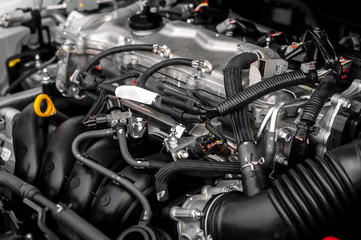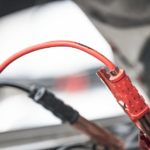Car engines are the heart of any vehicle, and choosing the right engine type is essential for getting the best performance, efficiency, and durability. There are several different types of car engines on the market, each with its own set of benefits and drawbacks. In this article, we will explore the various car engine types, their features, and which one is best for you.
The Importance of Choosing the Right Car Engine Type
Before we dive into the different types of car engines, it’s essential to understand why choosing the right engine type is crucial. The engine type you choose can significantly impact your driving experience, as well as the overall cost of owning and maintaining your vehicle.
For example, if you prioritize fuel efficiency, a hybrid engine may be the best choice for you. On the other hand, if you’re looking for power and performance, a gasoline engine or a diesel engine may be more suitable. Understanding the pros and cons of each engine type can help you make an informed decision and get the best value for your money.
Types of Car Engine
1. Internal Combustion Engines (ICE)
An Internal Combustion Engine is a type of engine that uses fuel and air to create small explosions in the engine’s cylinders. These explosions cause the pistons to move, which in turn drives the car’s wheels. ICEs are commonly found in gasoline or petrol-powered vehicles.
How ICEs Work
ICEs work by compressing a mixture of fuel and air inside the engine’s cylinders. This mixture is then ignited by a spark plug, causing an explosion that drives the car’s pistons and creates power. The pistons are connected to a crankshaft, which converts the linear motion of the pistons into rotational motion that drives the car’s wheels.
ICEs come in several different configurations, such as inline, V-shaped, and flat. Each configuration has its own unique characteristics and advantages. For example, inline engines are typically more fuel-efficient and easier to repair, while V-shaped engines are more compact and provide better performance.
Pros and Cons of ICEs
Like any type of engine, ICEs have their own set of advantages and disadvantages. One of the main advantages of ICEs is their power output. ICEs are capable of producing high levels of power and torque, making them suitable for a wide range of driving conditions and applications.
Another advantage of ICEs is their fuel efficiency. Advances in technology have allowed ICEs to become more efficient than ever before, with some models achieving over 50 miles per gallon. However, ICEs are still not as efficient as some other engine types, such as electric or hybrid engines.
One of the biggest disadvantages of ICEs is their environmental impact. ICEs produce emissions that contribute to air pollution and global warming. This is a major concern for many people, as governments around the world implement stricter emissions regulations and consumers become more environmentally conscious.
Popular Cars with ICEs
Despite their disadvantages, ICEs remain the most common type of engine found in cars today. Some popular examples of cars that use ICEs include the Ford Mustang, Chevrolet Camaro, and Dodge Challenger. These cars are known for their high-performance characteristics and powerful engines.
2. Diesel Engines

Diesel engines are commonly found in heavy-duty vehicles, such as trucks and buses. However, they are also used in smaller cars, especially in Europe, where diesel fuel is more widely available and less expensive than gasoline. Diesel engines work differently from gasoline engines, as they use compression to ignite the fuel, rather than spark plugs.
How Diesel Engines Work
Diesel engines work by compressing the air inside the cylinder, which heats it up. Then, diesel fuel is injected into the cylinder, and the heat of the compressed air causes it to ignite and burn, driving the piston down and turning the crankshaft. Diesel engines are known for their high torque output, which makes them ideal for heavy loads and towing.
Benefits of Diesel Engines
One of the main benefits of diesel engines is their fuel efficiency. Diesel fuel contains more energy per gallon than gasoline, which means that diesel engines can go further on a tank of fuel. In addition, diesel engines have a higher compression ratio, which makes them more efficient at converting fuel into power.
Another benefit of diesel engines is their longevity. Diesel engines are built to withstand higher pressures and temperatures than gasoline engines, which makes them more durable and longer-lasting. This is why diesel engines are often used in commercial vehicles that rack up high mileage.
Popular Diesel Engine Cars
Some of the most popular diesel engine cars on the market include the Volkswagen Golf TDI, the BMW 328d, the Chevrolet Cruze Diesel, and the Mercedes-Benz E250 BlueTEC. These cars offer excellent fuel efficiency, torque, and reliability, making them a good choice for drivers who value these qualities.
Read more: What Happens If You Don’t Change Car Oil?
3. Hybrid Engines
A hybrid engine is a type of car engine that combines two or more power sources to propel the vehicle. In most cases, hybrid engines combine an internal combustion engine (ICE) with an electric motor. The ICE is typically a gasoline-powered engine, but it can also be a diesel engine or another type of fuel. The electric motor is powered by a battery pack that is charged by regenerative braking and the ICE.
How do Hybrid Engines Work?
Hybrid engines work by using the electric motor and ICE together to power the car. At low speeds, the car is powered by an electric motor, which provides quiet, emissions-free propulsion. When the car needs more power, such as when accelerating or climbing a hill, the ICE kicks in to provide additional power. The electric motor and ICE work together seamlessly, switching back and forth as needed to provide the best performance and fuel efficiency.
Advantages of Hybrid Engines
One of the biggest advantages of hybrid engines is their fuel efficiency. By combining the power of an electric motor with a gasoline-powered engine, hybrid cars can achieve much better gas mileage than traditional cars. In addition, hybrid engines produce fewer emissions than traditional engines, making them a more environmentally-friendly option. Hybrid cars also tend to have a longer lifespan than traditional cars, as the electric motor puts less stress on the ICE.
Another advantage of hybrid engines is that they provide better torque than traditional engines, making them ideal for city driving. The electric motor provides instant torque, which means that hybrid cars can accelerate quickly from a stop, making them ideal for stop-and-go traffic.
Disadvantages of Hybrid Engines
One of the main disadvantages of hybrid engines is their cost. Hybrid cars tend to be more expensive than traditional cars, and the cost of the battery pack can be a significant expense. In addition, hybrid cars require specialized maintenance, which can also add to the cost of ownership.
Another disadvantage of hybrid engines is that they can be less reliable than traditional engines. While hybrid engines are generally well-made, the complex technology involved can make them more prone to failure. In addition, the batteries used in hybrid cars can degrade over time, reducing their overall lifespan.
Examples of Hybrid Engine Cars
There are a number of hybrid-engine cars on the market today, ranging from small hatchbacks to luxury sedans. One of the most popular hybrid cars is the Toyota Prius, which has been around for over 20 years and is known for its excellent gas mileage. The Honda Accord Hybrid is another popular hybrid car, offering a comfortable ride and good performance. Luxury car enthusiasts may be interested in the BMW i8, a hybrid sports car that combines electric and gasoline power to deliver excellent performance.
Read more: Best Car Engine Oil In UAE
4. Electric Engines
Electric engines are becoming more popular due to Dubai’s dedication to sustainability and environmental conscience. Because these engines are driven by electricity, they emit no emissions, making them suitable for people looking for an environmentally friendly vehicle.
- Electric engines are substantially more efficient than traditional combustion engines, which is one of their key benefits.
- They run on battery power rather than gasoline or diesel, enabling them to drive longer on less energy.
- This makes them perfect for city travel, where frequent halts and starts may compromise engine efficiency.
- Electric motors have fewer moving parts than internal combustion engines, resulting in less deterioration over time and lower maintenance costs.
- Buying an electric car in Dubai may save you money due to tax breaks.
- One downside of electric cars is their limited range since most models cannot go long distances between charges.
- Furthermore, owners will want access to charge stations before long excursions or suffer lengthy home recharging sessions.
Examples of Electric Engine Cars
Tesla is the first company that comes to mind when it comes to electric cars. The Tesla Model S is a popular electric car with a range of up to 405 miles. The Model S has a top speed of 200 mph and can accelerate from 0-60 mph in just 1.98 seconds, making it one of the fastest electric cars in the world.
Another example of an electric car is the Nissan Leaf. The Leaf has a range of up to 149 miles and is an affordable option for those looking to purchase an electric car. It has a top speed of 93 mph and can accelerate from 0-60 mph in just 7.7 seconds.
The Chevrolet Bolt is another electric car with a range of up to 259 miles. It has a top speed of 91 mph and can accelerate from 0-60 mph in just 6.5 seconds.
Which Engine Type Is Best for You?
Ultimately, the best engine type for you will depend on your personal preferences, driving habits, and budget. If you prioritize environmental friendliness and have a short commute, then an electric engine may be the best option. However, if you primarily drive long distances on highways, then a diesel engine may be more suitable. Ultimately, it’s important to weigh the pros and cons of each engine type and consider your own needs and priorities when making a decision.
FAQs
Which engine is stronger?
It depends on the specific engine and its design, as well as the intended use and driving conditions. Generally, diesel engines are known for their strength and durability, while electric engines offer instant torque and acceleration. Hybrid engines combine the benefits of both, but may not be as powerful as diesel engines in terms of towing capacity and heavy-duty applications.
Ultimately, the strength of an engine depends on various factors, and it’s best to consult with a professional or conduct research before making a decision.
Which car engine is long life?
The longevity of a car engine depends on various factors, such as maintenance, driving conditions, and the quality of the engine components. Generally, diesel engines are known to have a longer lifespan than gasoline engines due to their sturdier construction and ability to withstand higher compression ratios.
However, with proper care and maintenance, modern gasoline and hybrid engines can also have a long lifespan. Ultimately, the longevity of a car engine depends on how well it is maintained and driven.
What type of engine is more economical in Dubai?
In general, electric engines are considered to be the most economical because they require less maintenance, have fewer moving parts, and are powered by electricity, which is often cheaper than gasoline or diesel fuel. Hybrid engines can also be quite economical, as they combine the benefits of both electric and gasoline engines, allowing for improved fuel efficiency.
However, the actual economy of an engine type can vary based on factors such as driving habits, vehicle weight, and road conditions.
Conclusion
The best engine type for you depends on your individual needs and priorities. Consider factors such as the distance you travel, your driving habits, and your budget when making your decision. With so many options available, you’re sure to find the perfect engine type for your needs.
For professional car repair services in Dubai UAE, contact us at +971505073124.





